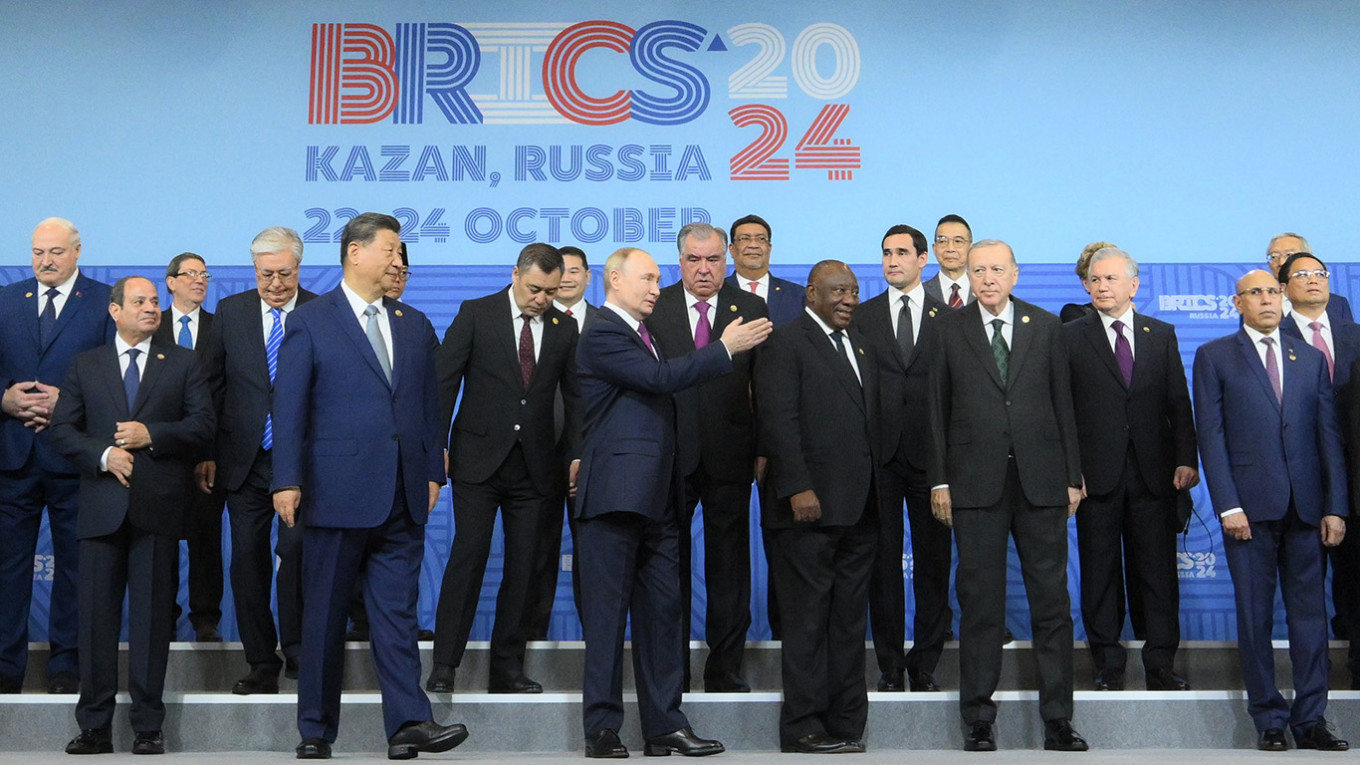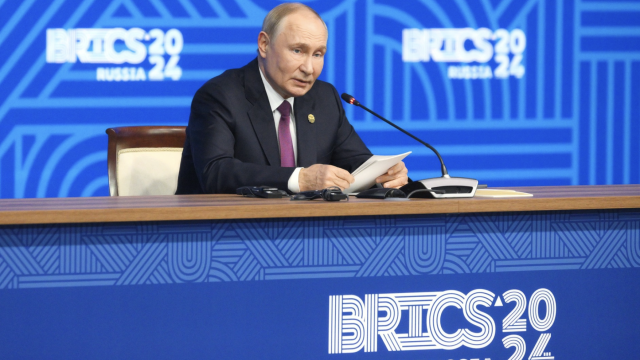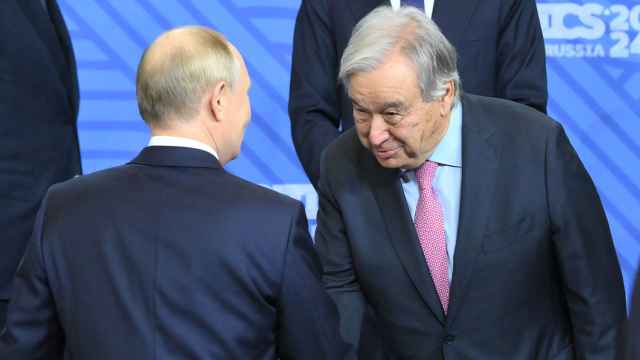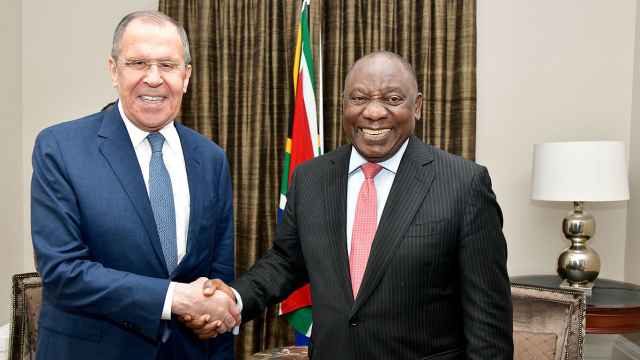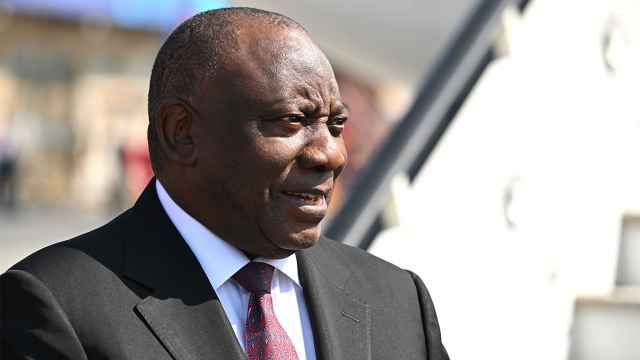The Russia-hosted BRICS summit came to a close on Thursday in Kazan, the capital of Russia’s republic of Tatarstan.
The largest international event held in Russia since it invaded Ukraine more than two years ago, the summit was seen as a tool for the Kremlin to shake off its pariah status and strengthen its influence in the Global South.
The Moscow Times gathered key takeaways from the three-day event:
Who attended?
Among the first state leaders to arrive in Kazan on Tuesday were Ethiopian Prime Minister Abiy Ahmed followed by Indian Prime Minister Narendra Modi, South African President Cyril Ramaphosa and China’s Xi Jinping.
Brazil, a founding member of the bloc, was represented by Foreign Minister Mauro Vieira after President Luiz Inacio Lula da Silva had to cancel his trip due to a head injury. But Lula still attended key summit meetings over video calls and held a one-on-one phone meeting with Putin.
High-ranking representatives of 36 countries participated in the summit, including Turkish President Recep Tayyip Erdogan, the only leader of a NATO country present.
Leaders of BRICS member states were greeted on the red carpet by Tatarstan’s head Rustam Minnikhanov and were invited to take a bite of chak-chak, a traditional Tatar treat of fried dough and honey.
UN Secretary-General Antonio Guterres also arrived in Tatarstan on Wednesday despite criticism from Kyiv, whose foreign ministry dubbed the visit “a wrong choice that does not advance the cause of peace.”
What was said?
Chinese leader Xi Jinping on Tuesday hailed his country's ties with Russia in a "chaotic" world during a bilateral meeting with Vladimir Putin — the leaders’ third face-to-face talk this year.
"The world is undergoing profound changes unseen in a century, and the international situation is chaotic and intertwined," Xi told Putin, praising the "profound friendship" between their two countries.
Indian Prime Minister Modi discussed the war in Ukraine during his one-to-one meeting with the Russian president, stressing a wish for a “peaceful” and “quick” resolution of the conflict.
Serbia’s Deputy Prime Minister Aleksandar Vulin was one of the four high-ranking officials representing the nation at the summit despite the EU advising all candidate countries — which Serbia has been since 2012 — to “refrain from contacts with Russia and its President Vladimir Putin” in the wake of the Kazan event.
“I don’t see Serbia’s future in the European Union…But BRICS is very important. BRICS is becoming a real alternative to the EU,” Vulin told the Russian state-run RIA Novosti news agency, adding that Belgrade, nevertheless, will not stop “working towards the EU” membership.
What kinds of agreements were signed?
BRICS+ members released the final communique, the Kazan declaration, on Wednesday.
The declaration touched on a wide range of topics from Russia’s invasion of Ukraine to hostilities in the Middle East to new financial mechanisms spearheaded by the alliance.
BRICS+ members vowed to welcome “a peaceful resolution” of the Ukraine war “through dialogue and diplomacy” and expressed “grave concern” and “alarm” over Israel’s military offensive on Gaza and attacks on southern Lebanon.
The alliance also backed admitting the state of Palestine within the 1967 borders to the UN and the revival of the Iran nuclear deal.
Members “underscored the need to reform the current international financial architecture” and “the use of local currencies in financial transactions between BRICS countries and their trading partners.”
The declaration also hailed the establishment and expansion of the BRICS Grain Exchange, a commodities trading platform spearheaded by Moscow.
Were there any incidents?
Authorities partially shut down mobile internet across Kazan on Tuesday, citing “heightened security measures.”
And ahead of the summit, many activists and journalists in Kazan received written notices from the security services warning them against partaking in unauthorized protests, rallies and meetings.
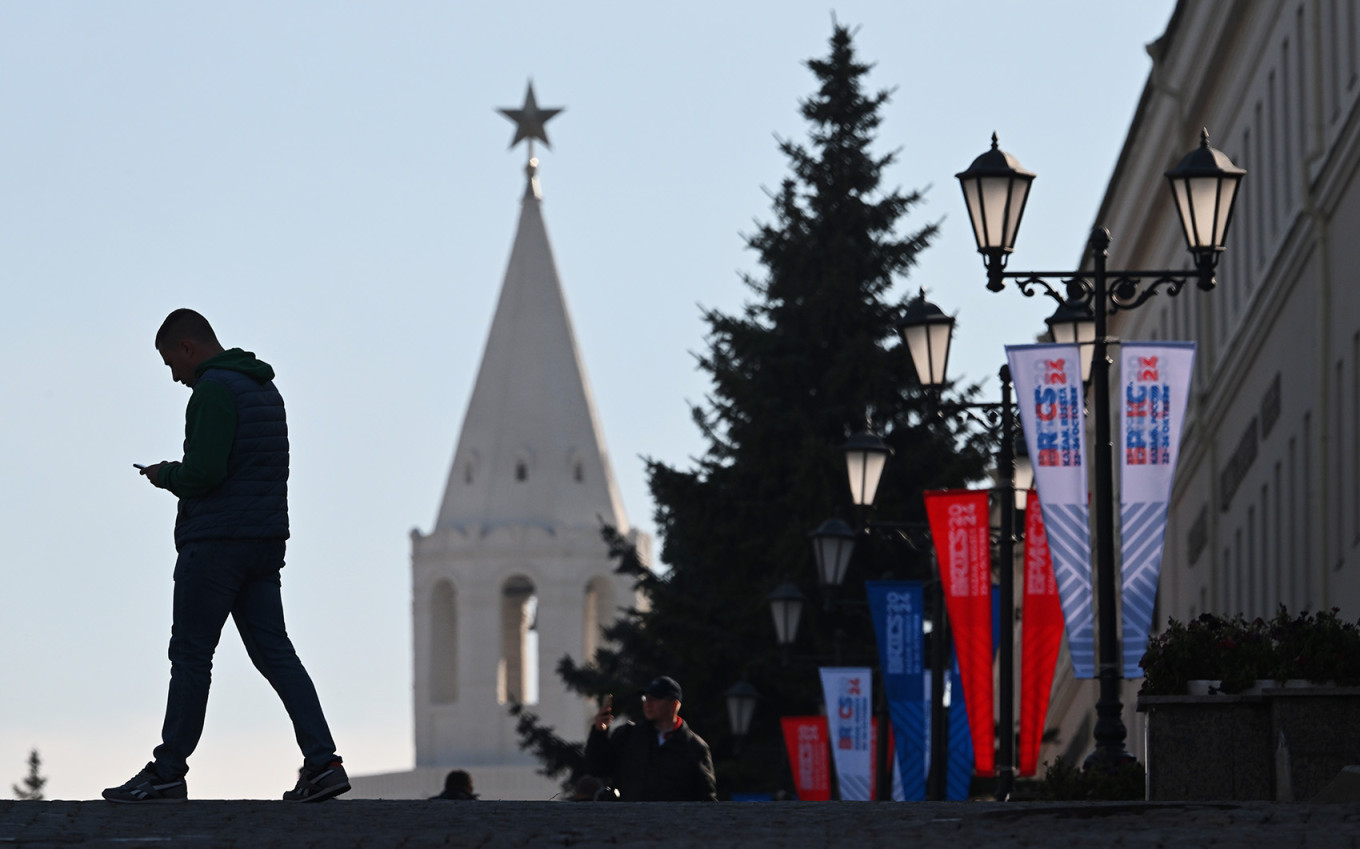
What are analysts saying?
The U.S.-based Institute for the Study of War said the summit provided Russia with “an opportunity to showcase its efforts at enhancing global ties with non-Western states” and “establish deals and trade mechanisms through which it can support its war efforts in Ukraine by mitigating the impacts of Western sanctions.”
Hanna Notte, director for Eurasia at the James Martin Center for Nonproliferation Studies, noted that optics and political messaging play a much larger role in understanding the summit’s impact than tangible deliverables.
Though Notte agreed that the summit would help Putin with dismantling his global outcast status while BRICS partners helped the Kremlin to prolong the war in Ukraine by “throwing lifelines to the Russian economy and defense enterprise,” she also noted that members of the alliance ultimately “cannot and will not help Russia win that war.”
“That is because Moscow cannot leverage the growing circle of BRICS members and partners to help it solve its core problems: finite ammunition and manpower…Ukrainian resistance, and above all Western support for Ukraine,” Notte wrote on X.
“Most Russian partners in BRICS+ also have no intention of following Moscow’s lead into a post-Western world…To them, BRICS+ is a vehicle for strategic hedging,” she added, referring to the expanded version of the alliance that includes Egypt, Ethiopia, Iran and the United Arab Emirates.
AFP contributed reporting.
A Message from The Moscow Times:
Dear readers,
We are facing unprecedented challenges. Russia's Prosecutor General's Office has designated The Moscow Times as an "undesirable" organization, criminalizing our work and putting our staff at risk of prosecution. This follows our earlier unjust labeling as a "foreign agent."
These actions are direct attempts to silence independent journalism in Russia. The authorities claim our work "discredits the decisions of the Russian leadership." We see things differently: we strive to provide accurate, unbiased reporting on Russia.
We, the journalists of The Moscow Times, refuse to be silenced. But to continue our work, we need your help.
Your support, no matter how small, makes a world of difference. If you can, please support us monthly starting from just $2. It's quick to set up, and every contribution makes a significant impact.
By supporting The Moscow Times, you're defending open, independent journalism in the face of repression. Thank you for standing with us.
Remind me later.



